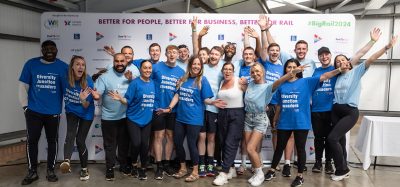Training is a serious game
Posted: 12 July 2024 | Mark Robinson - Chrome Angel Solution | No comments yet
For Global Railway Review’s latest Track Insight: Talent, Mark Robinson, Director at Chrome Angel Solutions, discusses how VR simulations are revolutionising accessibility and confidence in rail travel for individuals with disabilities, while also training the workforce to better understand and support diverse passenger needs.


Travelling on UK railways can be extremely challenging for the 14 million+ people with a wide range of mobility impairment, mental health conditions & cognitive impairments.
The report found that two thirds of disabled people have experienced problems using public transport in the last year and 30% of disabled people say that difficulties with public transport have reduced their independence”
The Fair Travel Report (Scope, September 2019) surveyed 2,000 disabled people about how difficulty using public transport affects their ability to lead independent, confident and connected lives. The report found that two thirds of disabled people have experienced problems using public transport in the last year and 30% of disabled people say that difficulties with public transport have reduced their independence. Not being able to travel with confidence has a big impact on disabled customers, and four fifths of disabled people said they feel some level of anxiety or stress when they travel by public transport. The Office for National Statistics has published new data that shows just 22% of autistic adults are in any kind of employment and this group can find travel particularly challenging.
Chrome Angel Solutions and technology partner Totem Learning have been working with industry partners Northern, Community Rail Lancashire and Angel Trains to develop an innovative Accessible Travel VR Simulation “Serious Game” to tackle this problem. It supports people who are anxious or need Passenger Assistance to build confidence to access travel by train. This is a first-of-a-kind use of serious games technology to simulate using a service and building confidence to access it.
Funding from the Department for Transport’s (DfT) TRIG: Accessibility programme delivered by Connected Places Catapult supported developing and testing a proof-of-concept demonstrator. This has recently been further enhanced and upgraded thanks to Innovate UK’s FOAK21 project, making the application available for wider trials and testing end users.
Funding from the DfT’s TRIG: Accessibility programme delivered by Connected Places Catapult supported developing and testing a proof-of-concept demonstrator”
After working closely with a group of 33 disabled people and carers over 6 months to develop the first release, users can now choose a character to experience trains, stations and interact with staff in a realistic simulated environment on their own phones, tablets, PCs or in VR headsets for a fully immersive experience.
Northern Accessibility User Group and Community Rail Lancashire groups supported the process of designing and testing the simulation bringing a broad range of travel, technology and accessibility experience. They engaged in design workshops and testing the prototypes. A customer experience map was built, detailing the process of a routine railway journey for a passenger with no accessibility support needs, a wheelchair user and an autistic traveller. This journey was overlaid with the challenges and anxieties identified by the users, which formed the foundation of the simulation experience.
The simulation platform provides for a wide range of user configurable accessibility settings for visual, audio and controls including multiple languages, visual schemes and controls whilst a headset version using gaze control is accessible to people who only have head movement.
A customer experience map was built, detailing the process of a routine rail journey for a passenger with no accessibility support needs, a wheelchair user and an autistic traveller”
Our vision is that someone who has never had the confidence to take the train before could arrive at the station for the first time and feel like an experienced traveller. To have all the information they need, know what support to expect and what to do if anything goes wrong. The simulation is specifically aimed at those people with disabilities who would otherwise lack confidence to use public transport, but can support anyone who is anxious about travel for any reason.
Community Rail Lancashire is now trialling the simulation in “Try the Train” supported journeys, as well as taking VR headsets into schools to engage children with special educational needs and wider groups, thanks to funding support from Angel Trains and Northern. We are continuing to work on developing the simulation for customer use and seeking support from industry partners for:
- Journey expansion to include changing operators
- Development of additional characters
- Development of enhanced accessibility support simulation detail
- Development of ‘challenge scenarios’
- Expanded testing and trials to prove user impact and benefits.
A key opportunity has been identified to develop a Staff Training version of the simulation to support building awareness, confidence and competence of staff to provide passenger assistance. This was highlighted by the user comment during testing that “every member of staff should have to play this simulation to understand how important their role is to me”.
A project is now being developed that will enable us to develop new Staff Characters. This is exactly the same concept as the passenger characters, only instead of a customer using the assistance available the ‘game’ will be played from the perspective of the staff character with the challenge to provide good assistance to customers who need it:
- Recognising customer needs
- Competent in the policy, process, information and standards
- Confidently interacting with customers and responding to their challenges and problems.
Data analytics, assessment and achievements will provide feedback to staff, instructors and managers. Staff awareness training is a key challenge for all operators. Raising staff awareness of the challenges disabled and elderly customers face when travelling, as well as building confidence and competence to interact with customers who need support, is one of the most important factors in making our railways more accessible.
In user testing 100% agreed the travel environment was detailed and realistic, 91% said that the simulated journey experience could help build confidence to travel by train, and 100% wanted to see the project developed further – demonstrating the potential of this technology to support a lot of people.
This was recognised with Northern winning the Gold Innovation award at the recent national cross industry Customer Experience Awards 22.


Related topics
Digitalisation, Global Railways Review's Track Insight: Talent, Passenger Experience/Satisfaction, Virtual Reality (VR)
Related organisations
Angel Trains, Chrome Angel Solutions, Community Rail Lancashire, Department for Transport (DfT), Northern








